Honda HR-V vs Mitsubishi Eclipse Cross - Differences and prices compared
Compare performance (131 HP vs 218 HP), boot space and price (29700 £ vs 41100 £ ) at a glance. Find out which car is the better choice for you – Honda HR-V or Mitsubishi Eclipse Cross?
Costs and Efficiency:
Looking at overall running costs, both models reveal some interesting differences in everyday economy.
Honda HR-V has a clearly perceptible advantage in terms of price – it starts at 29700 £ , while the Mitsubishi Eclipse Cross costs 41100 £ . That’s a price difference of around 11392 £.
Engine and Performance:
Power, torque and acceleration are the classic benchmarks for car enthusiasts – and here, some clear differences start to show.
When it comes to engine power, the Mitsubishi Eclipse Cross has a distinct edge – offering 218 HP compared to 131 HP. That’s roughly 87 HP more horsepower.
In acceleration from 0 to 100 km/h, the Mitsubishi Eclipse Cross is evident quicker – completing the sprint in 7.90 s, while the Honda HR-V takes 10.60 s. That’s about 2.70 s faster.
There’s no difference in top speed – both reach 170 km/h.
There’s also a difference in torque: Mitsubishi Eclipse Cross pulls a bit stronger with 300 Nm compared to 253 Nm. That’s about 47 Nm difference.
Space and Everyday Use:
Beyond pure performance, interior space and usability matter most in daily life. This is where you see which car is more practical and versatile.
Both vehicles offer seating for 5 people.
In terms of boot space, the Mitsubishi Eclipse Cross offers clearly perceptible more room – 487 L compared to 319 L. That’s a difference of about 168 L.
In maximum load capacity, the Mitsubishi Eclipse Cross performs noticeable better – up to 1670 L, which is about 381 L more than the Honda HR-V.
Who wins the race in the data check?
The Mitsubishi Eclipse Cross sits well ahead of its rival in the objective data comparison.
This result only shows which model scores more points on paper – not which of the two cars feels right for you.
Costs and Consumption
View detailed analysis
Engine and Performance
View detailed analysis
Dimensions and Body
View detailed analysis
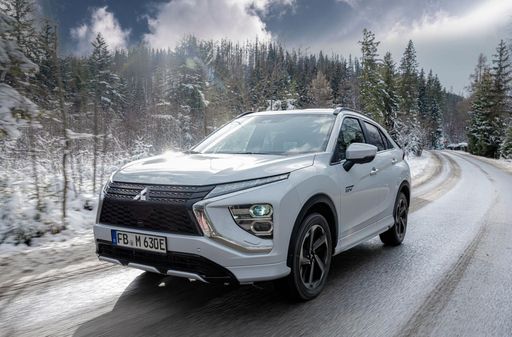
Mitsubishi Eclipse Cross
Honda HR-V
The Honda HR-V is the sensible compact crossover that blends roomy practicality with a composed, friendly drive, making it an easy pick for buyers who want everyday usability without fuss. It won’t thrill hardcore enthusiasts, but its clever packaging, comfortable cabin and low-key styling make life simpler — and that’s exactly the point.
details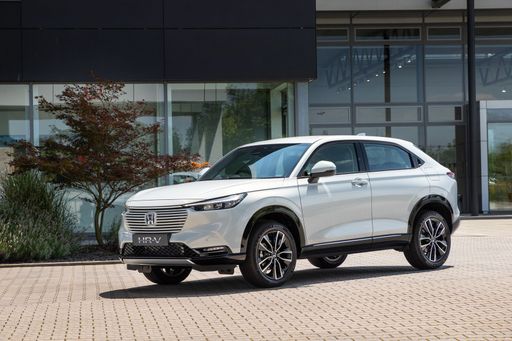
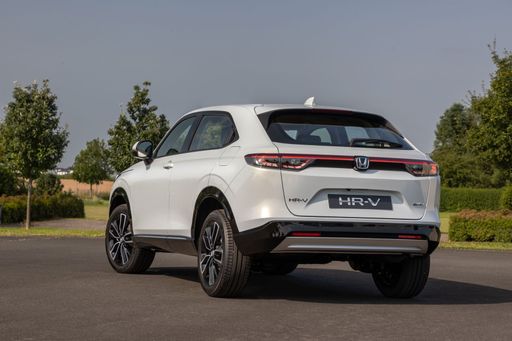

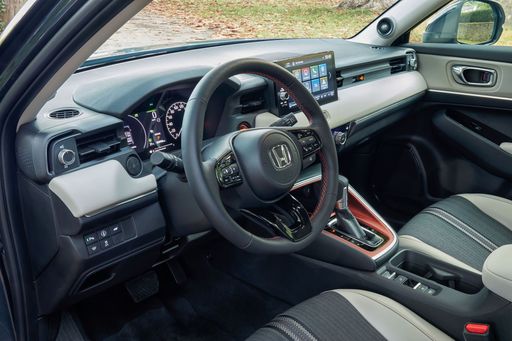
Mitsubishi Eclipse Cross
Mitsubishi Eclipse Cross combines coupe-like looks with crossover practicality, so you get style without the showroom attitude. It’s an affable daily driver that hides a few quirks behind a confident grin, making it an easy pick for buyers who want personality without fuss.
details
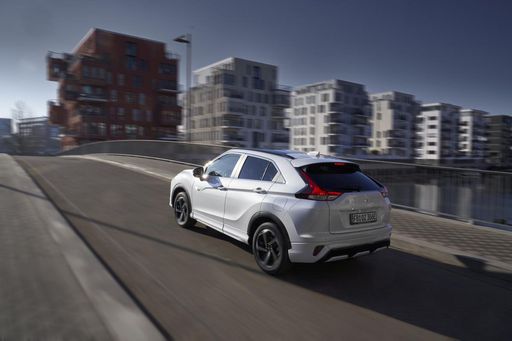
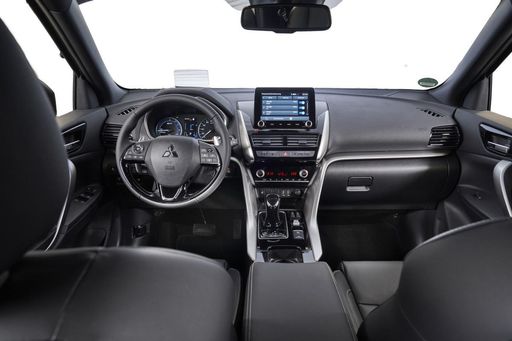
Costs and Consumption |
|
|---|---|
|
Price
29700 - 35400 £
|
Price
41100 - 48200 £
|
|
Consumption L/100km
5.40 L
|
Consumption L/100km
-
|
|
Consumption kWh/100km
-
|
Consumption kWh/100km
16.7 - 16.9 kWh
|
|
Electric Range
-
|
Electric Range
635 km
|
|
Battery Capacity
-
|
Battery Capacity
-
|
|
co2
122 g/km
|
co2
0 g/km
|
|
Fuel tank capacity
40 L
|
Fuel tank capacity
-
|
Dimensions and Body |
|
|---|---|
|
Body Type
SUV
|
Body Type
SUV
|
|
Seats
5
|
Seats
5
|
|
Doors
5
|
Doors
5
|
|
Curb weight
1452 kg
|
Curb weight
-
|
|
Trunk capacity
319 L
|
Trunk capacity
487 L
|
|
Length
4355 mm
|
Length
4489 mm
|
|
Width
-
|
Width
1908 mm
|
|
Height
1582 mm
|
Height
1571 mm
|
|
Max trunk capacity
1289 L
|
Max trunk capacity
1670 L
|
|
Payload
418 kg
|
Payload
-
|
Engine and Performance |
|
|---|---|
|
Engine Type
Full Hybrid
|
Engine Type
Electric
|
|
Transmission
Automatic
|
Transmission
Automatic
|
|
Transmission Detail
CVT
|
Transmission Detail
Reduction Gearbox
|
|
Drive Type
Front-Wheel Drive
|
Drive Type
Front-Wheel Drive
|
|
Power HP
131 HP
|
Power HP
218 HP
|
|
Acceleration 0-100km/h
10.6 - 10.8 s
|
Acceleration 0-100km/h
7.90 s
|
|
Max Speed
170 km/h
|
Max Speed
170 km/h
|
|
Torque
253 Nm
|
Torque
300 Nm
|
|
Number of Cylinders
4
|
Number of Cylinders
-
|
|
Power kW
96 kW
|
Power kW
160 kW
|
|
Engine capacity
1498 cm3
|
Engine capacity
-
|
General |
|
|---|---|
|
Model Year
2025
|
Model Year
2025
|
|
CO2 Efficiency Class
D
|
CO2 Efficiency Class
A
|
|
Brand
Honda
|
Brand
Mitsubishi
|
What drive types are available for the Honda HR-V?
The Honda HR-V is available as Front-Wheel Drive.




